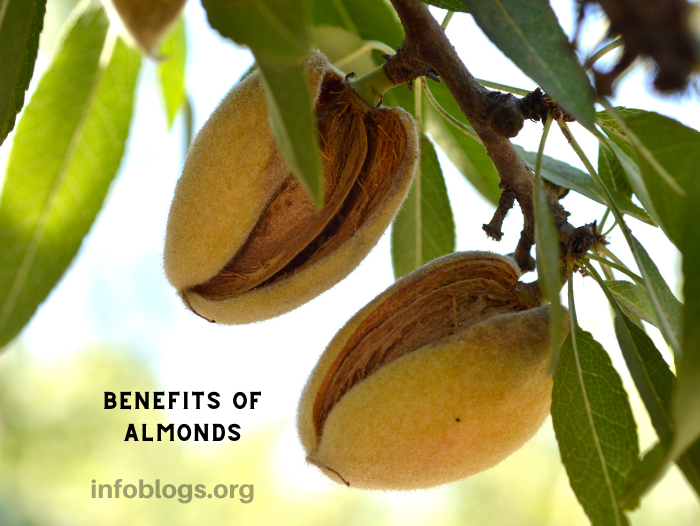Today we take a look at the benefits of almonds.
Almonds are a type of tree nut that are highly nutritious and loaded with health benefits. They have a rich, buttery flavor and a crunchy texture that make them a popular snack and ingredient in many dishes. Almonds have been cultivated for thousands of years and have an interesting history.
The first recorded mention of almonds dates back to ancient civilizations such as the Egyptians, who considered almonds to be a sacred food. The Romans also valued this nut and brought it with them as they conquered Europe. In fact, the word “almond” comes from the Latin word “amygdalus,” which means “tonsil plum.”
Today, almonds are grown in many parts of the world including California, Australia, Spain, Italy and Turkey. They are used in a variety of culinary applications such as almond milk, almond butter, baked goods and salads. Almonds are also packed with nutrients including protein, fiber, healthy fats and vitamin E making them an excellent addition to any diet.
Nutritional Value: Packed with Essential Nutrients
Almonds are considered one of the healthiest nuts due to their high nutritional value. These nuts are packed with essential nutrients that promote good health and well-being. For instance, almonds are an excellent source of vitamin E, a powerful antioxidant that helps protect the body against free radicals.
In addition, almonds contain healthy fats that help lower cholesterol levels and reduce the risk of heart disease. They also provide a good dose of fiber, protein, magnesium, and calcium which support digestive health and strengthen bones. Furthermore, research suggests that consuming almonds may aid in weight loss as they have been shown to increase feelings of fullness.
Overall, incorporating almonds into your diet can offer many potential benefits for your overall health. Whether added to meals or enjoyed as a snack on their own or in the form of almond milk or butter, these delicious nuts can provide a wealth of nutrients to support optimal wellbeing.
Health Benefits: Lowering Cholesterol, Blood Sugar Levels & Blood Pressure
Almonds are an excellent source of nutrients and offer several health benefits. One of the most significant advantages is that they can help lower cholesterol levels. Almonds contain high amounts of unsaturated fats, which can reduce LDL or “bad” cholesterol levels in the body. Eating almonds regularly has been shown to decrease total cholesterol levels by up to 5%, making them a great addition to a heart-healthy diet.
Another benefit of consuming almonds is their ability to regulate blood sugar levels. Almonds have a low glycemic index, meaning they do not cause sudden spikes in blood sugar levels after eating them. This makes them an ideal snack for people with diabetes or those who want to manage their blood sugar levels better. Furthermore, research has found that consuming almonds may improve insulin sensitivity, leading to improved glucose uptake and utilization.
Lastly, almond consumption may also aid in reducing blood pressure levels. As high blood pressure is a risk factor for heart disease and stroke, incorporating almonds into your diet may provide some protection against these conditions. Studies have shown that regular almond intake leads to decreased systolic and diastolic blood pressure readings compared to those who did not consume almonds regularly.
In conclusion, introducing almonds into your diet can be extremely beneficial for your overall health and wellbeing. Not only do they taste delicious but they also offer numerous health benefits including lower cholesterol, regulated blood sugar levels and reduced blood pressure readings – all key factors for maintaining optimal heart health!
Almonds for Weight Loss: Rich in Fiber & Protein
Almonds are an excellent snack for anyone looking to lose weight or maintain a healthy weight. They are rich in fiber and protein, which helps you feel full faster and stay full longer. This means that you're less likely to overeat during meals or snack on unhealthy foods throughout the day.
Additionally, almonds have a low glycemic index, which means they won't cause a spike in your blood sugar levels like many other snacks will. This makes them an ideal choice for people with diabetes or those who are trying to manage their blood sugar levels.
Furthermore, almonds contain healthy fats that can help reduce inflammation and promote heart health. So not only do they help with weight loss, but they also support overall health and wellness. Adding almonds to your diet is an easy way to make healthier choices without sacrificing flavor or satisfaction!
Skincare Benefits: Anti-Aging and Moisturizing Properties
Almonds have numerous skincare benefits due to their high content of vitamins and minerals. One of the most notable benefits is their anti-aging properties. Almonds contain antioxidants such as vitamin E, which help to combat free radicals that cause damage to skin cells, leading to premature aging. These antioxidants also improve skin elasticity and prevent fine lines and wrinkles from forming.
In addition to anti-aging benefits, almonds are also great for moisturizing the skin. They are rich in fatty acids such as Omega-3 and Omega-6 which help to lock in moisture and prevent dehydration. The oil extracted from almonds is often used in moisturizers, creams, and lotions due to its emollient properties.
Overall, incorporating almonds into your skincare routine can lead to a more youthful appearance with hydrated and nourished skin. Whether you consume them or use almond-based products on your skin directly, you can reap the many benefits that this powerful nut has to offer for both anti-aging and moisturization purposes.
Culinary Uses: Versatile Ingredient in Cooking & Baking
Almonds are considered as one of the most versatile ingredients in cooking and baking due to their ability to enhance the flavor, texture, and nutritional value of various dishes. They can be used in both sweet and savory recipes, making them an essential pantry item for any home cook or professional chef. In baking, almonds are commonly used to add a nutty flavor and crunch to cakes, muffins, cookies, and bread. Ground almonds or almond flour can also be used as a gluten-free alternative to wheat flour.
In addition to being a popular ingredient in baking, almonds are also widely used in savory dishes such as salads, stir-fries, curries, and sauces. They provide a rich source of protein and healthy fats that can help balance out the overall nutritional profile of any meal while adding depth of flavor and texture. Almond milk is another popular culinary use for this nut; it's often used as a dairy-free substitute in smoothies or cereal bowls. With so many culinary uses for almonds – from appetizers to desserts – it’s no wonder they’re considered one of the most versatile ingredients around!
Conclusion: Incorporating Almonds into Your Diet
Incorporating almonds into your diet can have numerous benefits for your overall health and wellbeing. Almonds are an excellent source of protein, fiber, healthy fats, vitamins, and minerals such as vitamin E, magnesium, and potassium. They have been linked to improved heart health by reducing LDL cholesterol levels and lowering blood pressure.
Additionally, consuming almonds may aid in weight management due to their satiating effect on hunger and potential to increase metabolic rate. Studies have also suggested that incorporating almonds into a daily diet may improve brain function and reduce the risk of cognitive decline in aging adults.
Overall, adding a handful of almonds to your daily snack or meal routine can be a simple yet effective way to support optimal health while also enjoying their delicious taste. So why not try incorporating them into your diet today?


